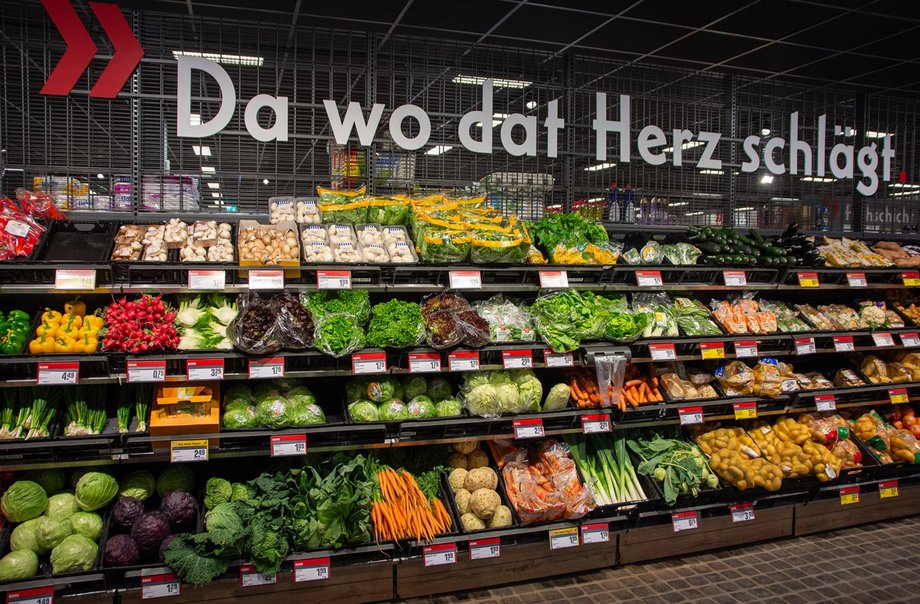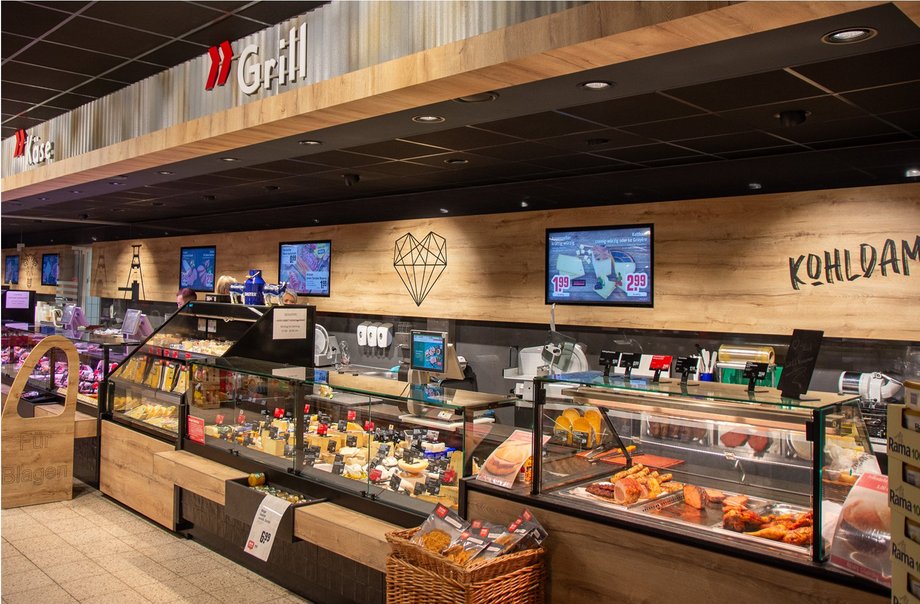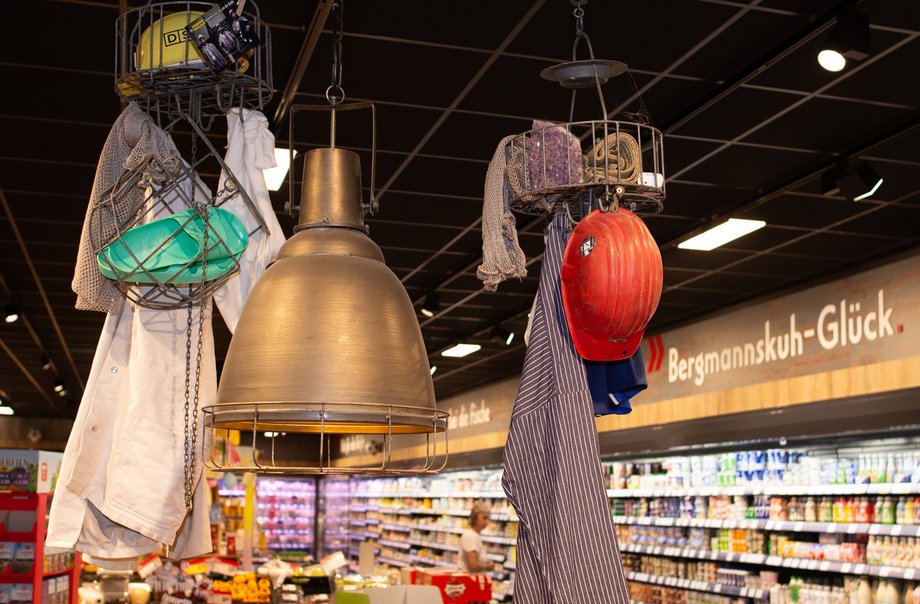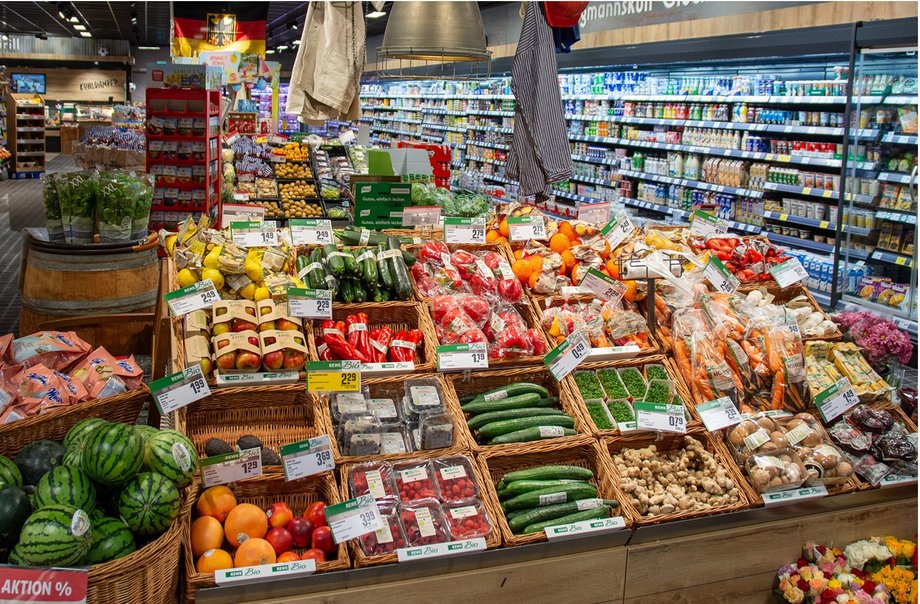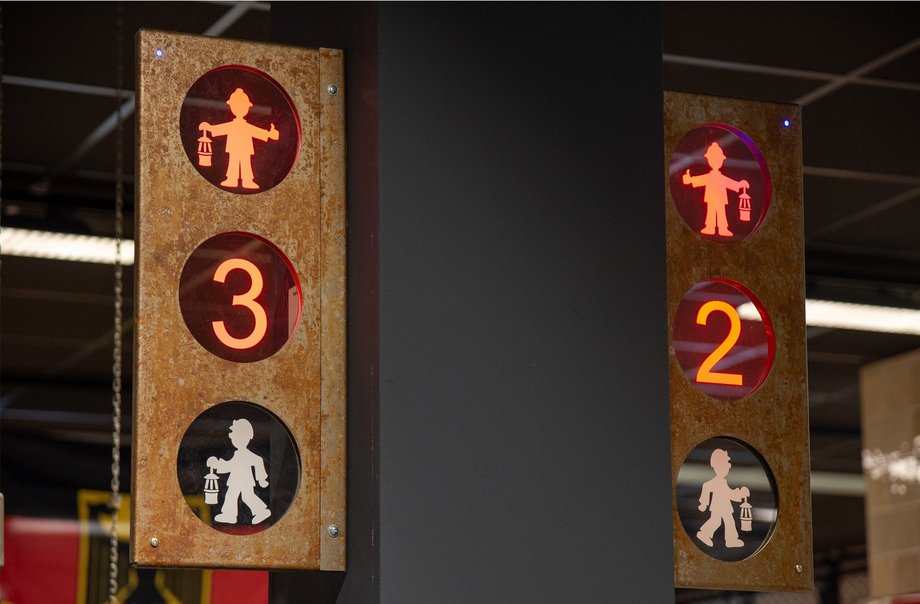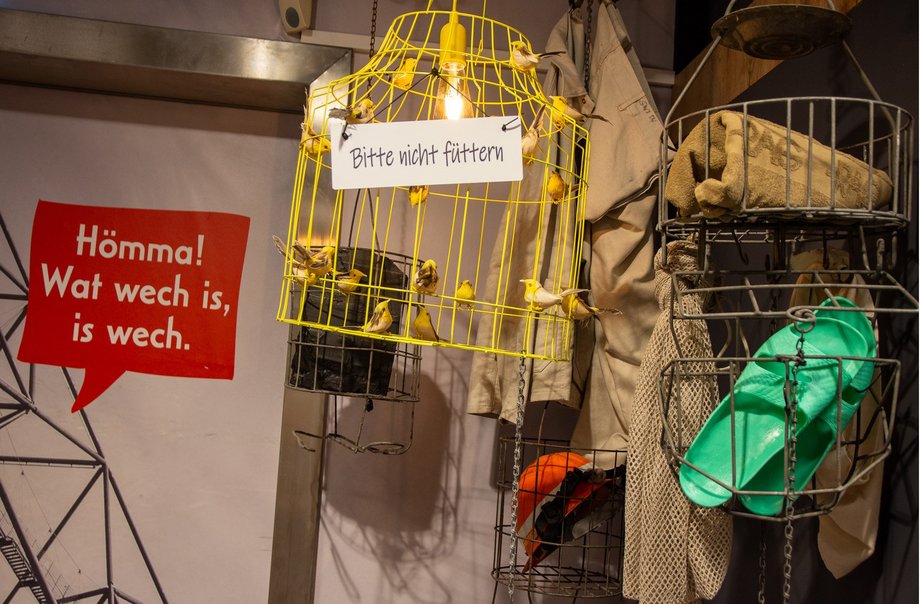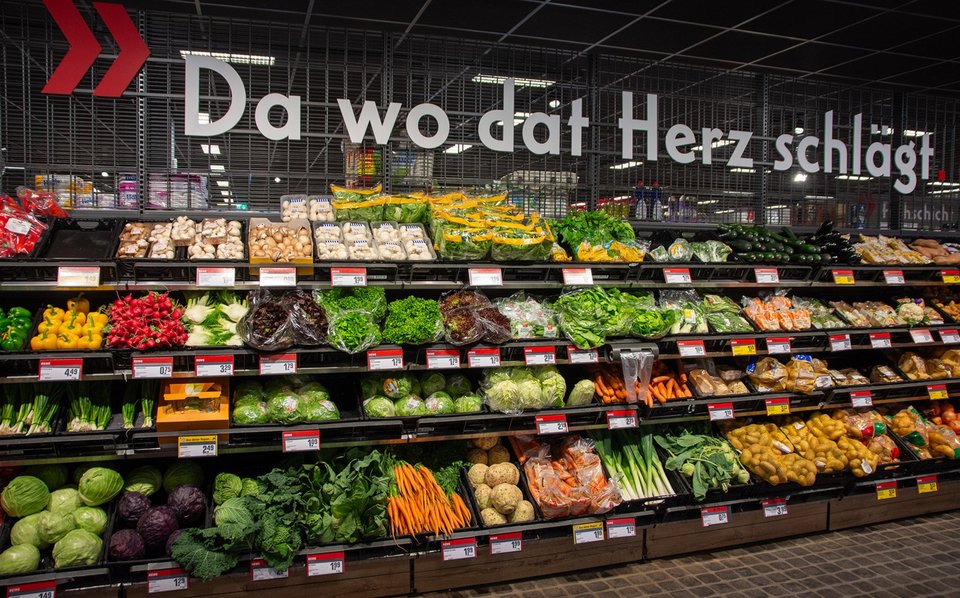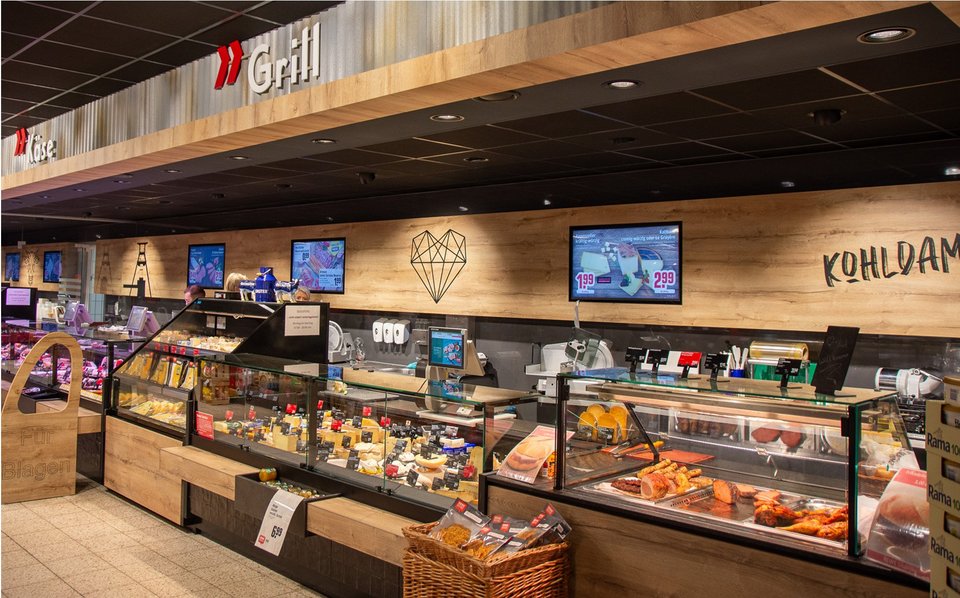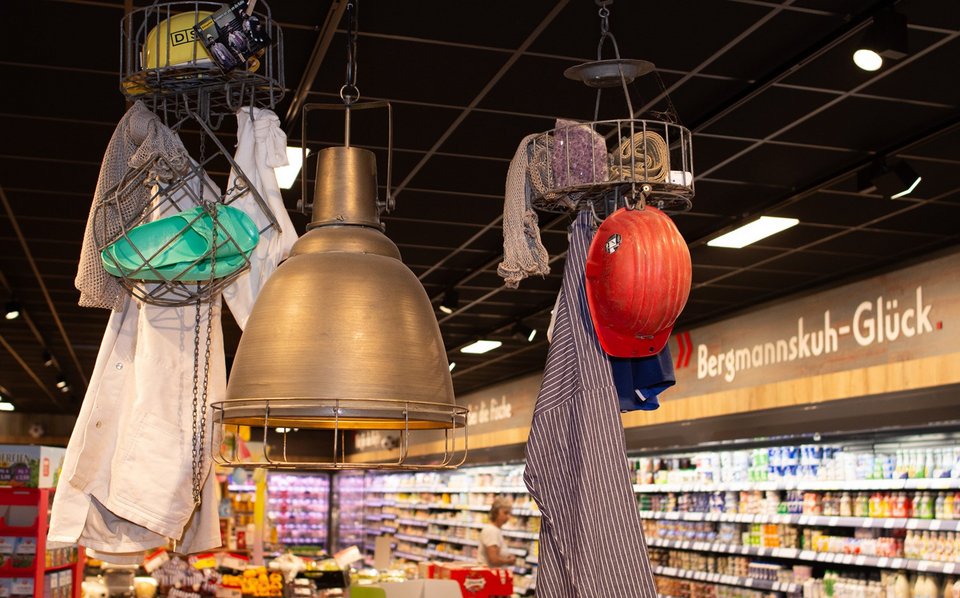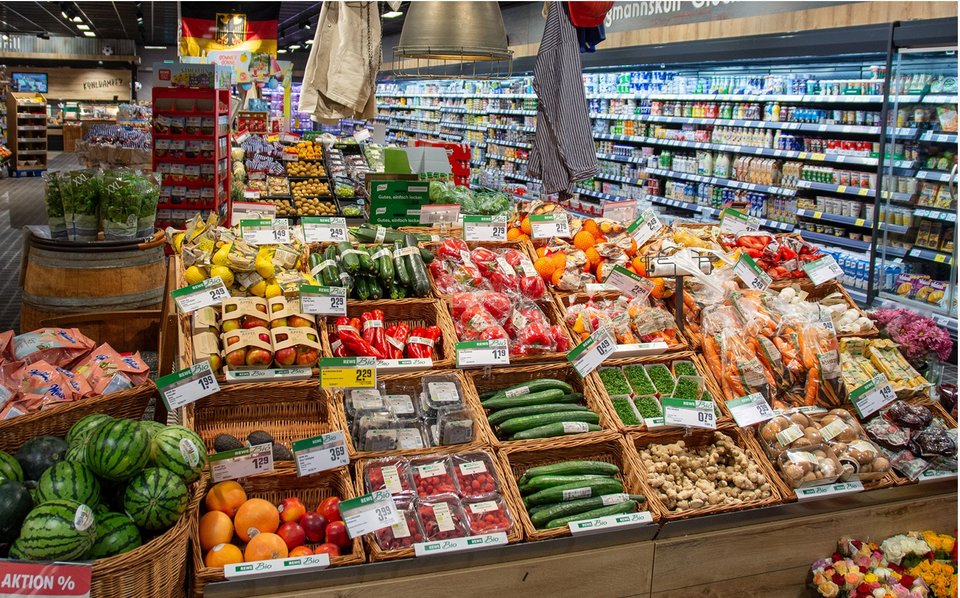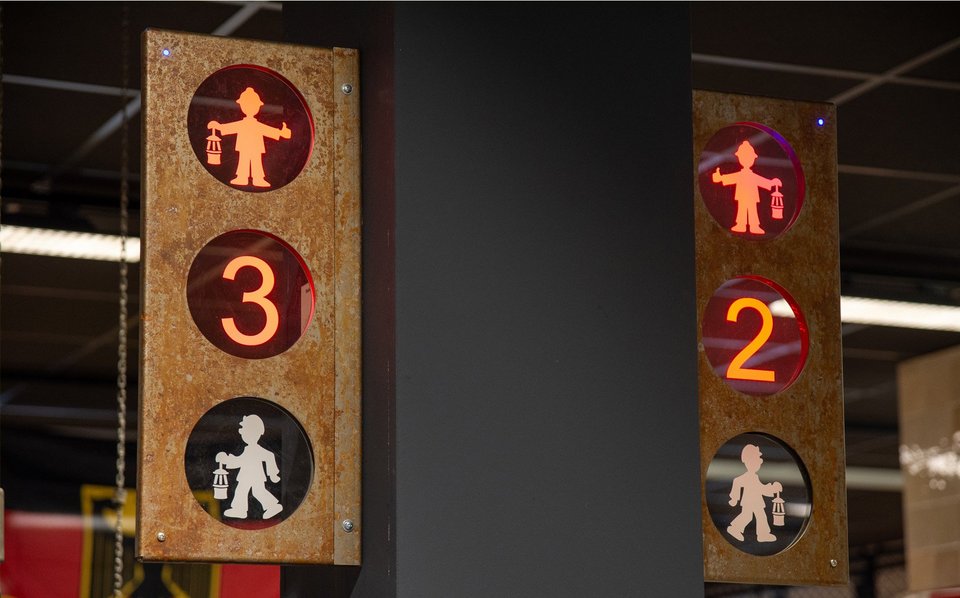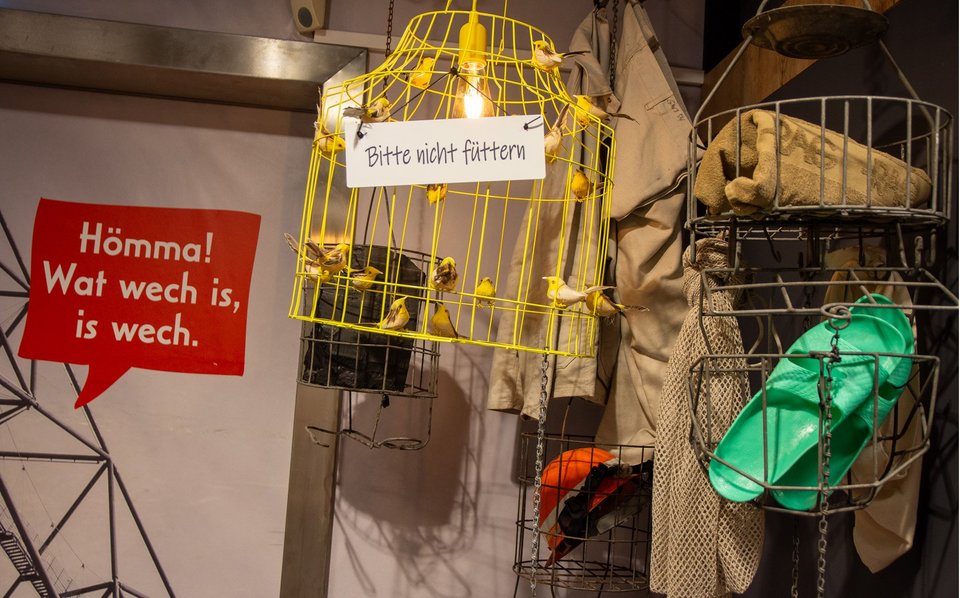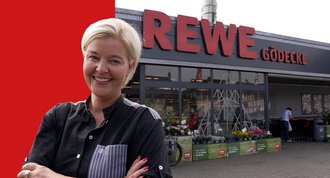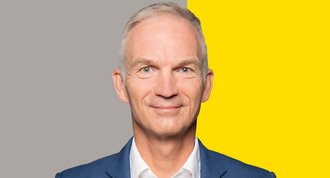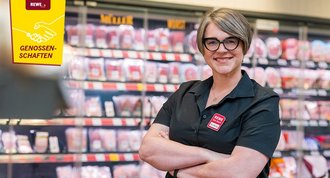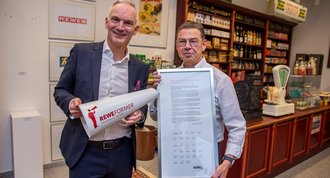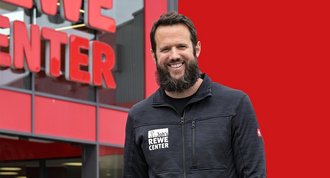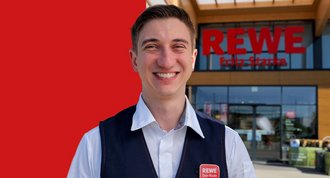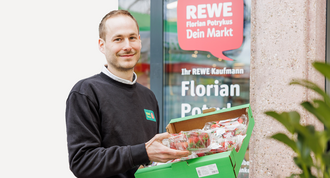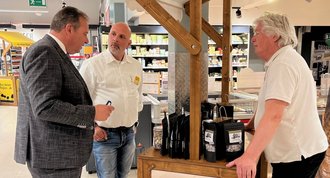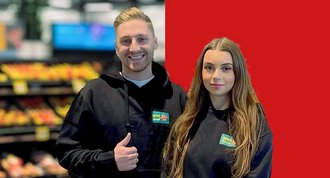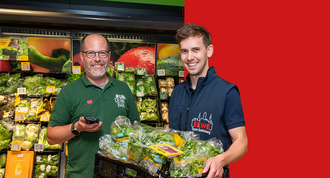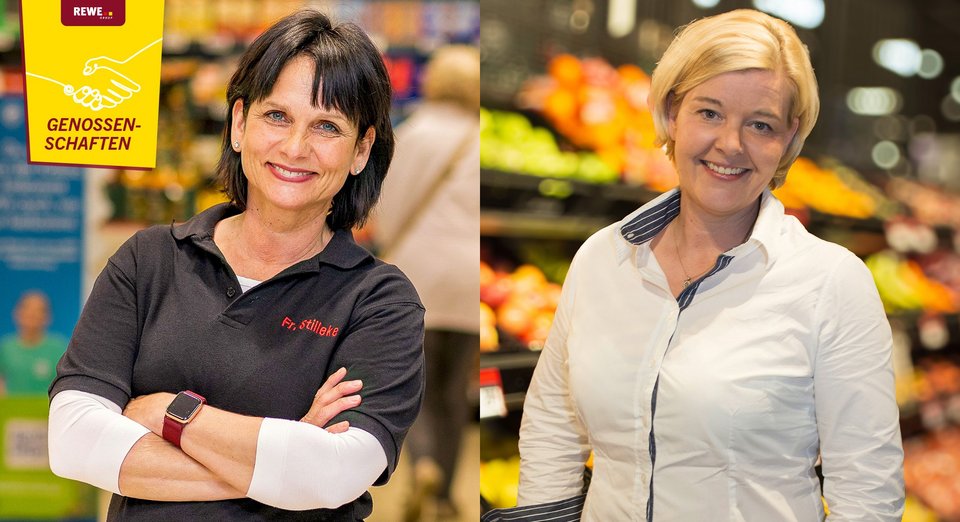
They have helped shape REWE and are also actively involved in the committees of the co-operatives. But although they are at least as successful as their male colleagues, they are quantitatively in the minority: REWE's saleswomen. We asked Sylvia Stilleke and Kathrin Gödecke why this might be.
In the one interview, Kathrin Gödecke and Sylvia Stilleke talk about their experiences as female entrepreneurs, from A for work to V for compatibility.
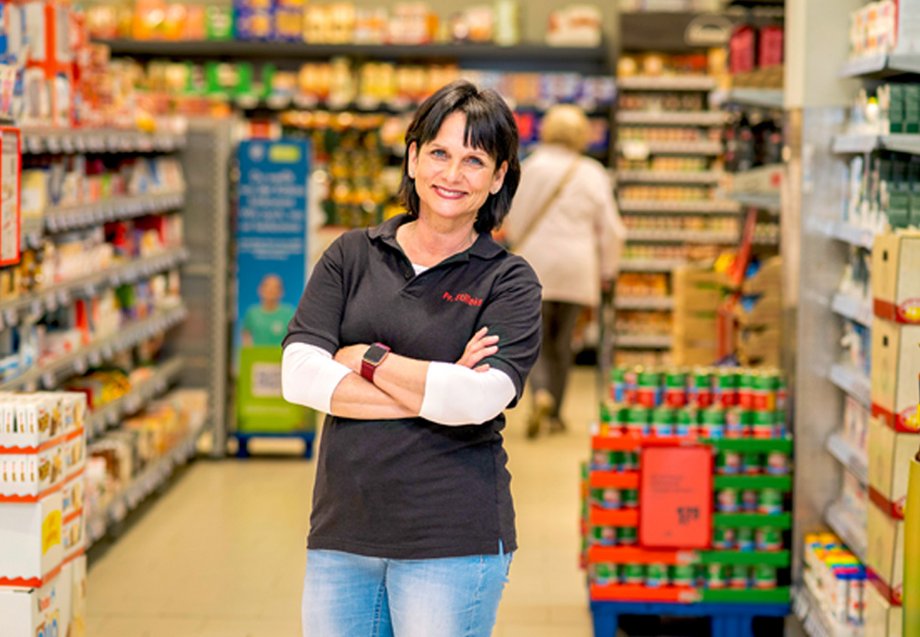 Sylvia Stilleke in her store in Essen-Burgaltendorf.
Sylvia Stilleke in her store in Essen-Burgaltendorf.
![]() Kathrin Gödecke: In the four generations of our family business, there have always been women who have played an active role. My grandmother inherited the business and saw it through the war and all kinds of crises.
Kathrin Gödecke: In the four generations of our family business, there have always been women who have played an active role. My grandmother inherited the business and saw it through the war and all kinds of crises.
Sylvia Stilleke: We have various departments in which we can organise working hours more flexibly. In the fresh produce department, it's not so important whether the employee starts at seven, eight or half past eight, depending on when the child goes to nursery. The main thing is that the work gets done. But of course there are also positions, for example at the checkout, where you can't organise the times so flexibly. We try to employ staff who are more flexible in their scheduling.
![]() Sylvia Stilleke: I think that men approach the whole thing a little more casually. But do it differently? No, I know retailers who are just as present in their market as I am and work a lot. You have to be a bit assertive. I learnt that during my time in Essen-Steele when I was a substitute. I had to prove myself there.
Sylvia Stilleke: I think that men approach the whole thing a little more casually. But do it differently? No, I know retailers who are just as present in their market as I am and work a lot. You have to be a bit assertive. I learnt that during my time in Essen-Steele when I was a substitute. I had to prove myself there.
Kathrin Göedecke: I never thought about whether a man could do the job better than a woman. I did what I thought was right. Women are often better at approaching employees. Managing employees is above all about communication, and the proportion of female employees in retail is known to be very high. Nevertheless, I clearly have my hat on. It's important to me that everyone knows that. It is also clear that I take individual needs into consideration.
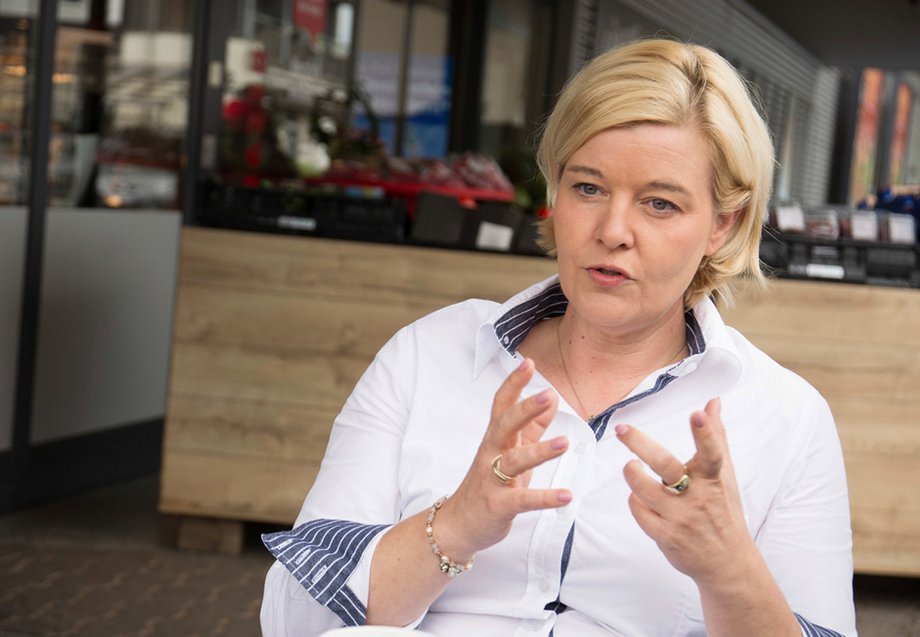 Kathrin Gödecke
Kathrin Gödecke
![]() Kathrin Gödecke: I have fixed office hours when I can be reached. The rest of the day I do things from home. It may look like a part-time model. But what I do on the side is what I call my "private life for self-employed retailers". But you're never really private. I live where I work. Almost everyone in town knows me as "the one from REWE". And just as I learnt from an early age, I've also taught my son to always be friendly and say hello.
Kathrin Gödecke: I have fixed office hours when I can be reached. The rest of the day I do things from home. It may look like a part-time model. But what I do on the side is what I call my "private life for self-employed retailers". But you're never really private. I live where I work. Almost everyone in town knows me as "the one from REWE". And just as I learnt from an early age, I've also taught my son to always be friendly and say hello.
Sylvia Stilleke: Work and private life can't always be clearly separated. As I only run one store, I am usually present and therefore well known. I once went to the bank to get my bank statements. I was totally lost in thought and obviously didn't notice a customer. She then went over to the market and asked the next colleague if her boss was in a bad mood. On the other hand, if everything is well organised, as a self-employed person I can also take some time off, for example a Saturday off.
![]() Kathrin Gödecke: My local ties play a role here, I have direct contacts with all the neighbouring schools, I sit on the IHK examination board for retailers, and I also have contacts in the vocational schools and direct feedback from my own trainees. This gives me the opportunity to speak directly to young people at education fairs, or teachers recommend us as a training company. The decision-making process is both a key and an obstacle. How do we get young people to decide in favour of a career in retail sales? We offer internships and, thanks to our experience, we quickly realise which of our apprenticeships would suit them. Once they are integrated into the company, they realise how varied the food retail sector is. No two days are the same. Perhaps that makes up for the working hours, which are often talked about so badly. We struggle with many prejudices.
Kathrin Gödecke: My local ties play a role here, I have direct contacts with all the neighbouring schools, I sit on the IHK examination board for retailers, and I also have contacts in the vocational schools and direct feedback from my own trainees. This gives me the opportunity to speak directly to young people at education fairs, or teachers recommend us as a training company. The decision-making process is both a key and an obstacle. How do we get young people to decide in favour of a career in retail sales? We offer internships and, thanks to our experience, we quickly realise which of our apprenticeships would suit them. Once they are integrated into the company, they realise how varied the food retail sector is. No two days are the same. Perhaps that makes up for the working hours, which are often talked about so badly. We struggle with many prejudices.
Many young people today are looking for stability, reliability and security, in the family and at work. As a long-established, crisis-proof employer, we are just right for them. According to forecasts, medium-sized family businesses will be better able to cope with the shortage of skilled labour than large corporations.
Sylvia Stilleke: We have a lot of pupils and students among our temporary staff who do a great job. They are mostly the sons and daughters of doctors, lawyers and so on. We have many who have been here for three or four years and do a really good job, but unfortunately are not interested in training at REWE.
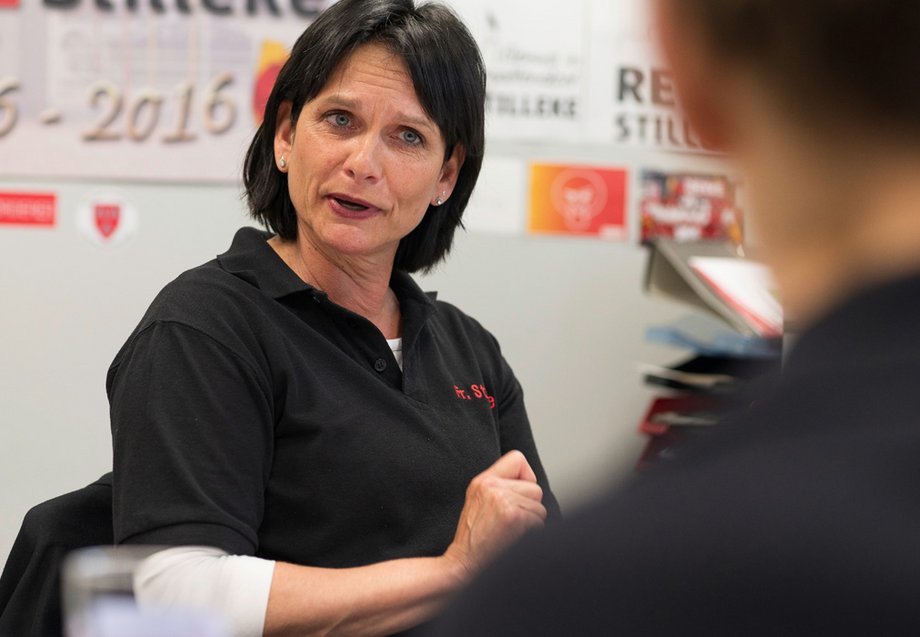 An interview with Sylvia Stilleke. We conducted the interview in her market office.
An interview with Sylvia Stilleke. We conducted the interview in her market office.
![]() Kathrin Gödecke: The most important thing in our company. Everything is fair with us, payment is transparent and our strategy is clear. Even if it hurts sometimes. Our many long-standing employees know where they stand with me. That's the way it is in our family: when we say something, we stick to it. I expect the same from my employees. Apart from that, I try to manage as casually as possible. To fulfil as many wishes as possible. I make the personnel plans myself.
Kathrin Gödecke: The most important thing in our company. Everything is fair with us, payment is transparent and our strategy is clear. Even if it hurts sometimes. Our many long-standing employees know where they stand with me. That's the way it is in our family: when we say something, we stick to it. I expect the same from my employees. Apart from that, I try to manage as casually as possible. To fulfil as many wishes as possible. I make the personnel plans myself.
Sylvia Stilleke: "Management style" sounds so big to me. The little things are important to me. For example, I make the staff schedules four weeks in advance. I try to take my employees' wishes regarding time off into account so that they can plan ahead. This reliability is important to me.
![]() Kathrin Gödecke: If you ask me, I couldn't have done anything better than being a shop assistant and selling food. I would have started straight after leaving school, but my father advised against it at the time. The work was already very physical. Now I'm the fourth generation to run two supermarkets. I learnt how to deal with food from an early age, it was always a topic at home. My grandparents and great-grandparents had butcher's shops in Essen and from this, a "corner shop" developed, which my father turned into the first supermarket, first Spar, then REWE. When the opportunity arose to open a second store and I joined, a large part of my father's work had long since moved to the office and changed a lot.
Kathrin Gödecke: If you ask me, I couldn't have done anything better than being a shop assistant and selling food. I would have started straight after leaving school, but my father advised against it at the time. The work was already very physical. Now I'm the fourth generation to run two supermarkets. I learnt how to deal with food from an early age, it was always a topic at home. My grandparents and great-grandparents had butcher's shops in Essen and from this, a "corner shop" developed, which my father turned into the first supermarket, first Spar, then REWE. When the opportunity arose to open a second store and I joined, a large part of my father's work had long since moved to the office and changed a lot.
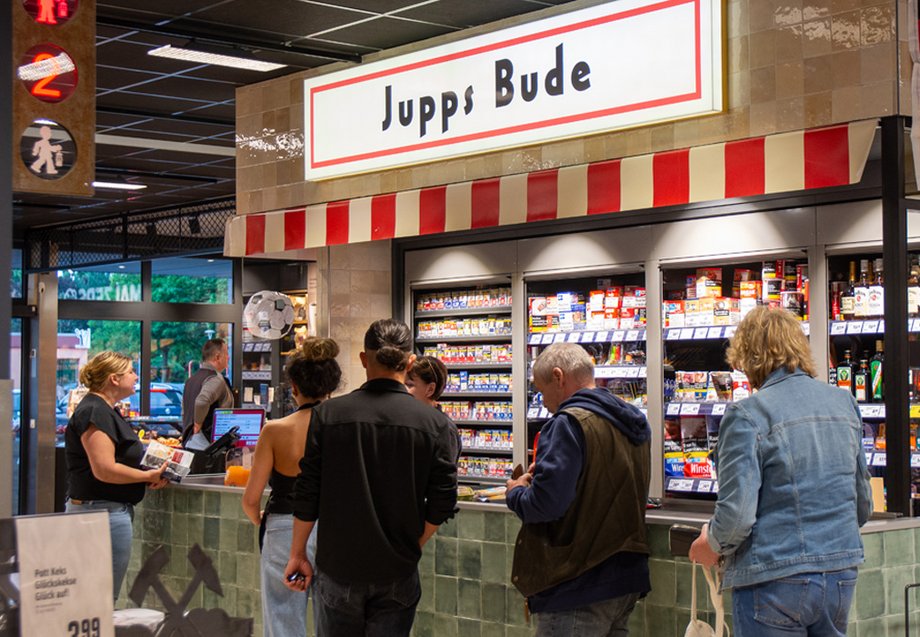 Nostalgic look: the cash register has been transformed into Jupp's Büdchen - pure Ruhr area charm.
Nostalgic look: the cash register has been transformed into Jupp's Büdchen - pure Ruhr area charm.
![]() Kathrin Gödecke: We don't have self-service tills. Not that I've forgotten about them. It was a conscious decision. Because I want our employees to be approachable for the customers. We have a regular customer share of 80 per cent in both stores with good service counter business and a lot of human contact. And the economic advantage would not be so exorbitant. It works very well for us without it. If my store was in a student town where everyone goes in and out quickly, then I would certainly see things differently. You have to orientate yourself to the location.
Kathrin Gödecke: We don't have self-service tills. Not that I've forgotten about them. It was a conscious decision. Because I want our employees to be approachable for the customers. We have a regular customer share of 80 per cent in both stores with good service counter business and a lot of human contact. And the economic advantage would not be so exorbitant. It works very well for us without it. If my store was in a student town where everyone goes in and out quickly, then I would certainly see things differently. You have to orientate yourself to the location.
That's also the reason why we don't have a fish counter. Our origins lie in a butcher's shop and we were always told that fish and meat don't go together. That has grown historically. And that's exactly what independent retail is all about: That we know quite well what's best for our location. Especially when you've been in a location for as long as we have.
Sylvia Stilleke: I think we paid attention to the little things right from the start and have always worked in the shop. That's still the case today, my husband and I are always on the floor and within reach... I love being close to the customers. If a customer asks for a particular item, we don't send them to the relevant shelf, we always go with them. Our customers really appreciate this, as we can see from the positive reviews on Google and elsewhere. We try to be close to our customers, even when it comes to exchanges, because every exchange is an opportunity to engage in dialogue with customers. Today, people like to give positive feedback, say that the staff are great or that the service at the sausage counter was excellent.
![]() Kathrin Gödecke: I don't follow every trend. I have my own ideas, which I naturally correct. If I realise something is a mistake, I don't go through with it. I admit to mistakes, and I also talk a lot with my family and my deputy.
Kathrin Gödecke: I don't follow every trend. I have my own ideas, which I naturally correct. If I realise something is a mistake, I don't go through with it. I admit to mistakes, and I also talk a lot with my family and my deputy.
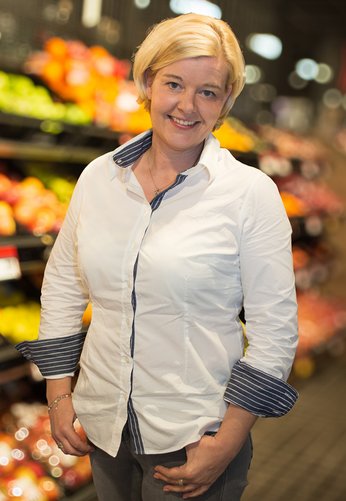 REWE businesswoman Kathrin Gödecke comes from a Bottrop family of merchants. After studying business administration and spending time in the USA, she worked as a category manager at the Coca-Cola Group for around ten years. When her 15-year-old son was born, she moved to the REWE store in Bottrop run by her father. Today, the 46-year-old is the fourth generation to manage two stores in Bottrop with sales areas of 1,150 and 890 square metres and a total of almost 100 employees, including nine trainees in various professions.
REWE businesswoman Kathrin Gödecke comes from a Bottrop family of merchants. After studying business administration and spending time in the USA, she worked as a category manager at the Coca-Cola Group for around ten years. When her 15-year-old son was born, she moved to the REWE store in Bottrop run by her father. Today, the 46-year-old is the fourth generation to manage two stores in Bottrop with sales areas of 1,150 and 890 square metres and a total of almost 100 employees, including nine trainees in various professions.
![]() Kathrin Gödecke: As a businesswoman, I believe I have a certain social responsibility for the neighbourhood. That's why I've taken on quite a lot of voluntary work since my son grew up. For example, I am Chairwoman of the IHK Regional Committee of the City of Bottrop and Vice President of the IHK Nord Westfalen. This is very much about political framework conditions. For my 100 employees, for the city, for the region. I talk to many people - from the Lord Mayor to the Minister President. They are all happy to talk to people and entrepreneurs on the ground and get an idea of the situation. The NRW Minister of Labour recently visited us in the market and spent an hour listening to what is going well here, what is not and what issues we believe need to be addressed.
Kathrin Gödecke: As a businesswoman, I believe I have a certain social responsibility for the neighbourhood. That's why I've taken on quite a lot of voluntary work since my son grew up. For example, I am Chairwoman of the IHK Regional Committee of the City of Bottrop and Vice President of the IHK Nord Westfalen. This is very much about political framework conditions. For my 100 employees, for the city, for the region. I talk to many people - from the Lord Mayor to the Minister President. They are all happy to talk to people and entrepreneurs on the ground and get an idea of the situation. The NRW Minister of Labour recently visited us in the market and spent an hour listening to what is going well here, what is not and what issues we believe need to be addressed.
Sylvia Stilleke: I was on the supervisory board of REWE Dortmund for four years, that was an honour, you get asked. I then stepped down because the company succession within the family didn't work out as planned and I needed to get back to my business. I am currently still active on the Advisory Board of REWE Dortmund.
![]() Kathrin Gödecke: The main issue that concerns us all is clearly the issue of securing labour and skilled workers. How we can ensure that we will still have employees in the future and not just rely on the ones we have available.
Kathrin Gödecke: The main issue that concerns us all is clearly the issue of securing labour and skilled workers. How we can ensure that we will still have employees in the future and not just rely on the ones we have available.
Sylvia Stilleke: Recruiting new employees is becoming increasingly challenging. Nowadays, people are given a chance even though you realise in the interview that they don't actually fit in. Assessment centres are a good tool for selecting prospective self-employed retailers. They allow you to identify one or two weaknesses, which you can then iron out through seminars or REWE support programmes.
![]() Kathrin Gödecke: We employ refugees and people with learning or physical disabilities. I have no reservations about that. For me, it's also a kind of service to society as a whole that our workforce reflects society. I also don't accept the results of the recent elections if someone is against them. I don't recruit on the basis of skin or hair colour. If someone is good, loyal and punctual, then I promise to always pay their wages on time and not to demand unpaid overtime. These are the values that I was taught myself in my family.
Kathrin Gödecke: We employ refugees and people with learning or physical disabilities. I have no reservations about that. For me, it's also a kind of service to society as a whole that our workforce reflects society. I also don't accept the results of the recent elections if someone is against them. I don't recruit on the basis of skin or hair colour. If someone is good, loyal and punctual, then I promise to always pay their wages on time and not to demand unpaid overtime. These are the values that I was taught myself in my family.
![]() Sylvia Stilleke: Before I started my own business, I worked for several colleagues in the commercial sector and gained valuable experience. I realised that every boss has their own way of doing things and you learn something from everyone. It's also good to have an advisor and ally. In my case, it was my customer advisor at REWE Dortmund, because you always have a lot of questions, especially at the beginning. A good network like the Talentcampus for young salespeople is also always a good idea.
Sylvia Stilleke: Before I started my own business, I worked for several colleagues in the commercial sector and gained valuable experience. I realised that every boss has their own way of doing things and you learn something from everyone. It's also good to have an advisor and ally. In my case, it was my customer advisor at REWE Dortmund, because you always have a lot of questions, especially at the beginning. A good network like the Talentcampus for young salespeople is also always a good idea.
Kathrin Gödecke: You have to prioritise very carefully, choose the location for your self-employment very carefully, spend a lot of time in the area at the beginning to get a feel for the location, for the customers. You should build up a network. Not only in your private circle, so that you can better reconcile work and family life. But also with other retailers, with other store managers, with whom you can exchange ideas. Maybe go to a good businessman for a year in advance, get some coaching on how to go into self-employment. And: don't be afraid of failure and have enough respect for the task!
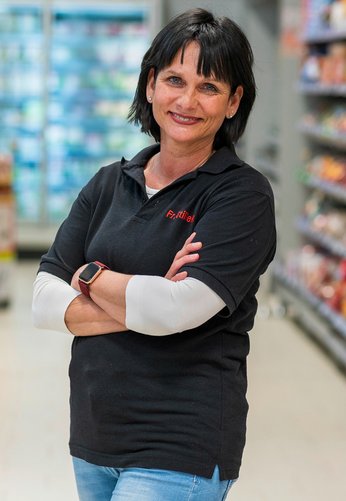 Sylvia Stilleke, 53, runs a REWE store in Essen-Burgaltendorf with around 60 employees together with her husband. Opened in 2006 with 880 square metres, the store was expanded to 1,250 square metres in 2014. Sylvia Stilleke started her career 36 years ago as an apprentice at REWE Freidank. She went on to work for Bosselmann and Sliwik, where she worked her way up through the ranks to become store manager. The businesswoman spent four years on the supervisory board of REWE Dortmund.
Sylvia Stilleke, 53, runs a REWE store in Essen-Burgaltendorf with around 60 employees together with her husband. Opened in 2006 with 880 square metres, the store was expanded to 1,250 square metres in 2014. Sylvia Stilleke started her career 36 years ago as an apprentice at REWE Freidank. She went on to work for Bosselmann and Sliwik, where she worked her way up through the ranks to become store manager. The businesswoman spent four years on the supervisory board of REWE Dortmund.
![]() Sylvia Stilleke: It's not easy with two children. I can see that with my daughter, who often has to pick up her children from daycare outside of her schedule. One alternative would be for the husband to stay at home and take on all the woman's responsibilities during this time: Bringing up the children, laundry, cooking...But I don't know anyone in my circle of acquaintances. Theoretically, you could go into self-employment later, when the children are older. The problem is that so much happens these days in the years you're out of work. New technologies, operating systems... You then have to relearn all that again so that you don't lose touch.
Sylvia Stilleke: It's not easy with two children. I can see that with my daughter, who often has to pick up her children from daycare outside of her schedule. One alternative would be for the husband to stay at home and take on all the woman's responsibilities during this time: Bringing up the children, laundry, cooking...But I don't know anyone in my circle of acquaintances. Theoretically, you could go into self-employment later, when the children are older. The problem is that so much happens these days in the years you're out of work. New technologies, operating systems... You then have to relearn all that again so that you don't lose touch.
Kathrin Gödecke: I have very clear priorities: My market and my child. I have always made time for my son. Of course, I have a huge advantage: the great support of a merchant's family: my father supported me in the business when needed and my mother was often there for my grandson. He was always looked after, and of course that makes you feel really good.

